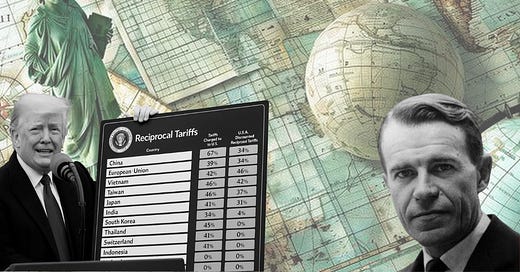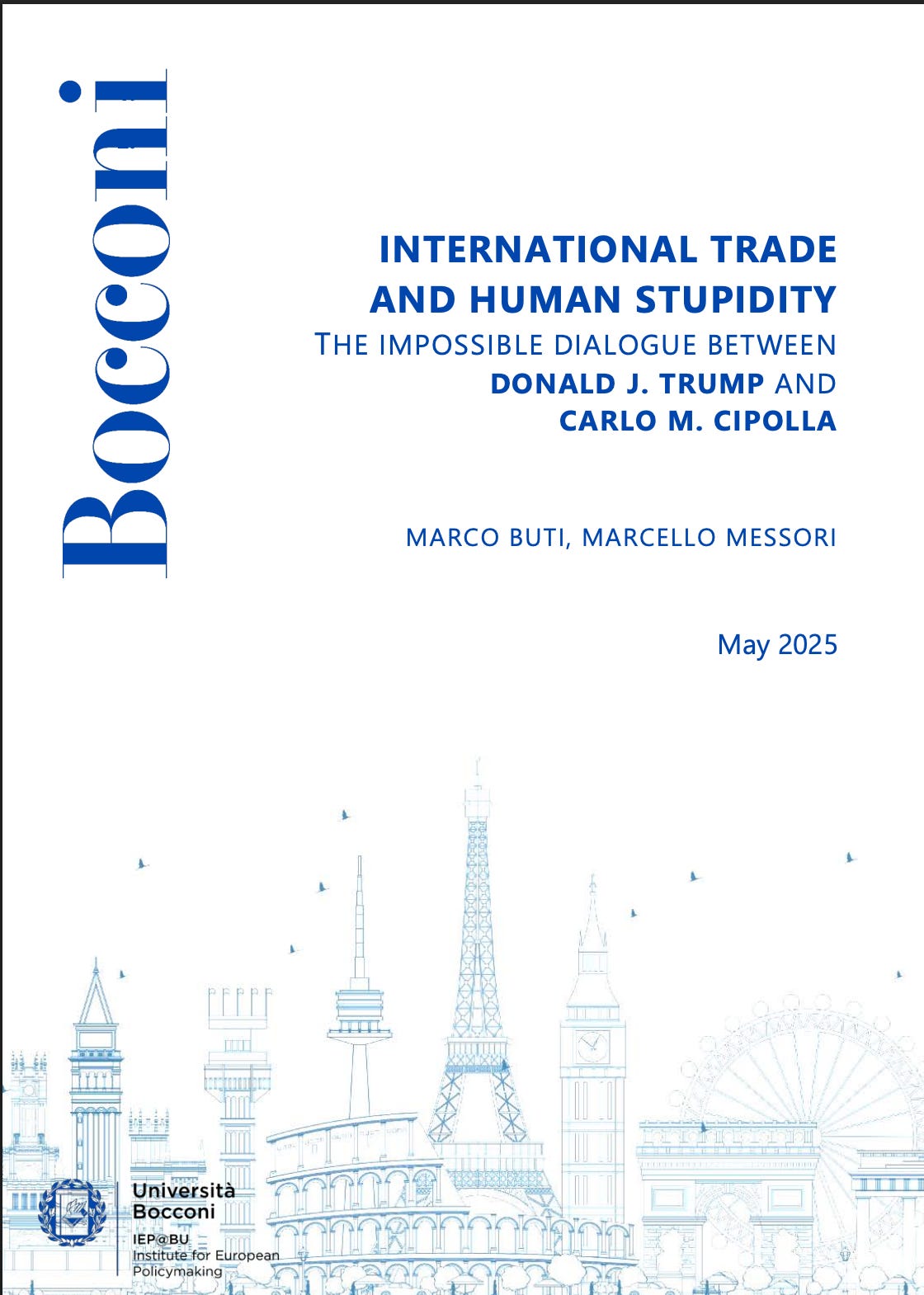International Trade and Human Stupidity: Carlo M. Cipolla meets Donald J. Trump
We unpack the logic—and the fallout—of the Trump administration’s tariff strategy. We present our analysis as an imagined conversation between President Trump and the late historian Carlo M. Cipolla
I used to earn my living by writing and selling books. Every time I finished a manuscript and shipped it to my publisher, I ran a large trade surplus with the latter. Had the publishing house insisted to adjust its bilateral trade balance with me, I would have been forced to get in return unselected manuscripts from other authors or – at best – books stocked by my publisher
(Imagined) Carlo Maria Cipolla
Download the Paper
Executive Summary
On April 2, 2025, dubbed “Liberation Day” by the White House, the U.S. launched a sweeping tariff offensive that shook the foundations of the post-Bretton Woods global trade system. Overnight, average U.S. tariffs were rolled back to levels not seen since the early 20th century, surpassing even the infamous Smoot-Hawley Tariff Act of 1930, which many blame for deepening the Great Depression.
Since then, tariffs have been slapped on, tweaked, suspended, and reimposed in a dizzying cycle of general, sector-specific, and retaliatory measures. Governments, markets, and investors have been left scrambling to keep up with a chaotic, unpredictable trade policy. But this isn’t just about tariffs.
The trade war has come hand in hand with a broader assault on the institutions of liberal democracy. In the first 100 days of the Trump 2 administration, 143 executive orders were issued, compared to 99 by FDR in 1933. Unlike Roosevelt’s Congress, which passed 77 laws (including the 15 major pillars of the New Deal), Trump’s Congress passed just four. Meanwhile, dramatic cuts have gutted public funding for research, education, and social programs.
In this brief, we unpack the logic, and the unintended fallout, of the administration’s strategy. We do so through the lens of game theory (informally) and contract theory (implicitly), arguing that if trade partners respond with resolve, the U.S. is unlikely to achieve its stated goals. Yet even if these policies are reversed, the damage may not be undone. The dynamics of extended games mean we can't simply “reset”, structural harm to both the global economy and the U.S. itself may prove lasting.
To explore this further, we present our analysis through an unexpected lens: an imagined conversation between President Trump and the late historian Carlo M. Cipolla, whose “Laws of Human Stupidity” remain as relevant as ever. With irony as a tool, not a gimmick, we aim to uncover serious strategic lessons for European negotiators facing a volatile and uncertain world.
Marco Buti
Since April 2023, Marco Buti holds the Tommaso Padoa Schioppa chair at the Robert Schuman Centre. Before joining the EUI, Buti was Chief of Staff of the Commissioner for the economy, Paolo Gentiloni. Between 2008 and 2019, he was Director-General for Economic and Financial Affairs at the European Commission. Moreover, he has been the Commission Finance Deputy at G7 and G20.
Marcello Messori
Marcello Messori is a part-time professor at the Schuman Centre, European University Institute (EUI), and a member of the EMU-Lab at the same Centre. He is a non-resident Fellow at the Institute for European Policy Making (IEP), Bocconi University. He is co-coordinator of the ‘Gruppo Europa’ at Astrid Foundation, and an IEP@BU non-resident fellow.
The IEP@BU Mission
Founded by Bocconi University and the Institute Javotte Bocconi, the Institute for European Policymaking @ Bocconi University combines the analytic rigor of a research institute, the policy impact of a think tank, and the facts-based effort of raising public opinion’s awareness about Europe through outreach activities. The Institute, fully interdisciplinary, intends to address the multi-fold obstacles that usually stand between the design of appropriate policies and their adoption, with particular attention to consensus-building and effective enforcement.
The Institute’s mission is to conduct, debate, and disseminate high-quality research on the major policy issues facing Europe, and the EU in particular, its Member States, and its citizens, in a rapidly changing world.
It is independent of any business or political influence.
The IEP@BU Management Council
Catherine De Vries, IEP@BU President
Daniel Gros, IEP@BU Director
Sylvie Goulard, IEP@BU vice-President, Professor of Practice in Global Affairs at SDA Bocconi School of Management
Silvia Colombo, IEP@BU Deputy Director
Carlo Altomonte, Associate Professor at Bocconi University and Associate Dean for Stakeholder Engagement Programs at SDA Bocconi School of Management
Arnstein Assve, Professor in Demography at Bocconi University
Valentina Bosetti, professor of Environmental and Climate Change Economics at Bocconi University
Elena Carletti, Dean for Research and Professor of Finance at Bocconi University
Eleanor Spaventa, Professor of European Union Law at Bocconi Law School











Brilliant